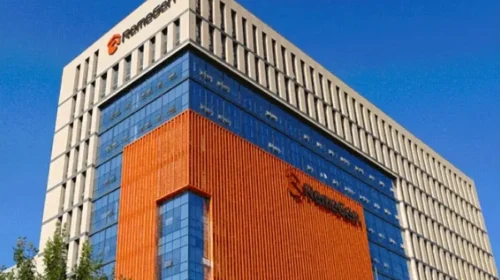Mao Geping dolls up for Hong Kong IPO

The high-end cosmetics brand banks heavily on the name of its famous founder, which may be one of its biggest risks
Key Takeaways:
- Mao Geping Cosmetics has filed for a Hong Kong IPO, reporting its revenue rose 58% last year while its profit jumped 88.6%
- The famous cosmetics brand is a typical family-run business, with five of its six executive directors coming from the founder’s family
By Ken Lo
Mao Geping made a name for himself as a makeup artist, touching up star actress Liu Xiaoqing in a popular TV drama about China’s most famous empress, Wu Zetian, before founding his namesake Mao Geping Cosmetics Co. Ltd. in 2000. But while celebrity came easy in the entertainment world, Mao was far less successful in his several attempts to list his company on China’s A-share market starting in 2016.
Now the makeup legend has turned his sights on Hong Kong, where his company filed a listing application earlier this month.
Mao Geping’s tough road to market probably has little to do with its business performance, which has actually been quite strong in recent years. Instead, the company’s over-reliance on Mao’s name and other related intellectual property (IP) may have been the regulator’s biggest concerns for not green-lighting the offering on the A-share market.
The company’s latest listing document also warns of the risks associated with a brand named after its founder, which could affect its image in the event of any personal misconduct by Mao, be it in the society pages or in his responsibilities as head of a publicly traded company.
In terms of business fundamentals, Mao Geping Cosmetics is quite competitive in the market for high-end cosmetics. It ranked 13th among China’s top 15 high-end brands by sales in 2022, according to third-party data in the listing document. It is also the only domestic brand on the list, which is dominated by big international names like L’Oréal, Estée Lauder and Nars.
Cosmetics have become huge business in China over the last three decades as the country’s economy boomed and such products became socially acceptable, reversing taboos on self-beautification in an earlier era. The country’s overall cosmetics market was worth 516.9 billion yuan ($71.4 billion) last year, up 6.4% from 2022, according to the “China Cosmetic Market Industry Development and Consumption Insight 2023” report.
Market outperformer
Mao Geping’s revenue growth has easily outpaced the broader market, rising more than 80% from 1.58 billion yuan in 2021 to 2.89 billion yuan last year. Its net profit doubled over that period from 331 million yuan to 664 million yuan. Last year was especially strong for the company as discretionary consumption picked up with the end of China’s pandemic restrictions. As that happened, the company’s revenue and profit jumped 58% and 88.6%, respectively, from 2022 levels.
The company’s gross margin has held steady at about 84% over the last three years, while its net margin has varied a bit, falling from 21% in 2021 to 19.2% in 2022 during the most difficult year of the pandemic, before rebounding to 23% last year. Marketing is easily the company’s biggest cost, at times reaching more than triple the actual cost of goods sold – showing where the real cost of beauty lies.
Mao Geping currently owns two major brands, its namesake and its smaller “Love Keeps” brand. The former is by far its biggest cash cow, accounting for more than 96% of its revenue from products sales in each of the last three years. That’s why, as we’ve previously mentioned, any negative news involving its founder poses one of the biggest risks to the company.
In terms of channels, offline direct sales accounted for 51.7% of its total last year, while online direct sales accounted for 33.5%. While online sales are growing the fastest, offline are equally important for cosmetic companies by providing customers with an opportunity to experience the product before buying, building trust in the brand.
The company’s operating cash flow has grown in tandem with its revenue over the last three years, with last year’s net operating cash flow of about 700 million yuan up 80% year-on-year from 390 million yuan in 2022. Mao Geping’s cash grew to 1.14 billion yuan by the end of last year from 888 million yuan a year earlier.
But additional data in the listing document shows the company’s cash dropped by 495 million yuan in the first two months of this year, with the result that its net current assets fell 43% from 1.17 billion yuan at the end of last year to 665 million yuan at the end of February. The company didn’t explain the decline, but it may be related to investment activities.
Family rules
Investors should also note that Mao Geping is a typical family business, with the founder and his spouse, Wang Liqun, calling the shots with 57.3% of the company’s shares. Mao serves as chairman and general manager, while Wang is vice chairman. Adding in stakes held by Mao’s two older sisters and Wang’s younger brother, and the family controls about 82% of the company’s shares.
What’s more, five of the company’s six executive directors are Mao family members, with the lone outsider as senior executive Song Hongquan. Song joined the board as early as 2002, and is now the president and general manager of the Mao Geping brand business department. Last year, Song made an annual salary of 4.75 million yuan, second only to the founder Mao Geping’s 5.94 million yuan.
While family ownership may underpin the company’s past success, such family control is often criticized by outsiders for giving too much power to a handful of people who may not always have minority shareholders’ interests in mind. Armed with such knowledge, potential fans of Mao Geping’s listing should pay special attention to such risk while subscribing to new shares – if and when the IPO finally makes it to market this time around.
To subscribe to Bamboo Works free weekly newsletter, click here






